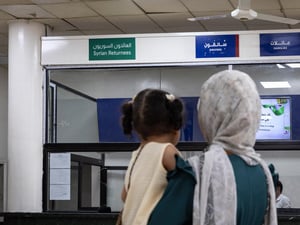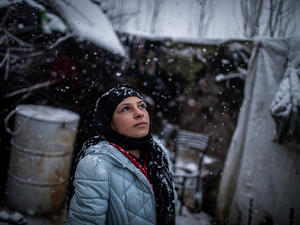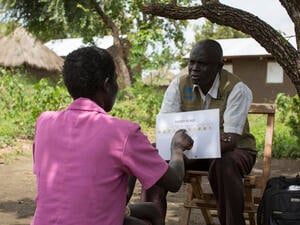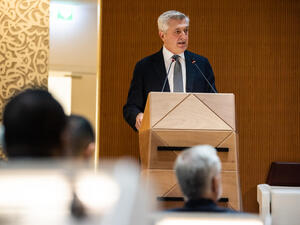UNHCR head says international community must share burden of Syrian refugees
UNHCR head says international community must share burden of Syrian refugees

Thousands of people flowed from Syria across the Peshkhabour border crossing into Iraq's Dohuk Governorate
GENEVA, September 30 (UNHCR) - The head of the UN refugee agency appealed on Monday for the international community to do more to share the burden on Syria's neighbours, warning that the immense number of Syrian refugees fleeing the war is threatening those countries' social and economic fabric.
"Lebanon, Jordan, Turkey and Iraq have been sheltering an unrelenting flood of Syrian refugees, saving lives and providing protection. They have been generous hosts to their neighbours, but all of them are stretched to their limits," António Guterres, the High Commissioner for Refugees, told delegates attending a high-level opening segment of UNHCR's annual Executive Committee meeting in Geneva.
By the end of last week, these four countries and Egypt, hosted more than 2.1 million registered Syrian refugees: more than 760,000 in Lebanon, 525,000 in Jordan, 490,000 in Turkey, 190,000 in Iraq and over 125,000 in Egypt. In addition, there are hundreds of thousands more who did not register or were already living in these countries as economic migrants.
"In the exercise of my mandate as High Commissioner for Refugees, it is my duty to ask the governments of these states, like all others, to open their borders and continue to provide protection for all Syrians," Guterres said. "But it is also my duty to ask the international community to realize that this burden is far too heavy to be borne by only the neighboring countries, and to put in place more - and more robust - measures of sharing this burden."
The UNHCR head said that host nations need far more than just an increase in humanitarian aid; they could require substantial financial help, including emergency development assistance for sectors like health, education, housing, water and energy
"Some of the countries affected may require direct budget support. Many hosting communities need massive longer-term development investment, as the challenges they are now facing are only likely to grow," he said.
So far countries have funded 47 per cent of the nearly US$3 billion requested by the United Nations to assist Syrian refugees in the region and 54 per cent of the additional US$1.4 billion requested by the United Nations for humanitarian assistance to the displaced inside Syria.
"The Syria conflict is not just a threat to global peace and security, but it results in fundamental, structural problems for the countries of the region. They are going through huge demographic changes following the refugee influx, unsettling their social and economic fabric," Guterres said.
Across the region, job markets, salaries and prices have been affected, leaving refugees and many local families struggling to make ends meet. In Lebanon, a recent World Bank study has concluded that unemployment could double by the end of next year, with an additional 170,000 Lebanese pushed into poverty.
Guterres said the government of Turkey has covered almost all of the US$2 billion cost of taking care of its Syrian refugees from its own budget. Syria's southern neighbour, Jordan estimates that the cost of hosting Syrian refugees will reach US1.7 billion by the end of this year. It has spent hundreds of millions of dollars in extra subsidies for water, bread and electricity since the civil war broke out and refugees began arriving nearly two years ago.
"I am enormously frustrated to see all appeals for a political solution fall on deaf ears, and the various parties still unable to come together and put an end to the suffering of Syrians and the gradual destabilization of neighboring countries," he said. "But as the fighting still drags on, today's meeting on solidarity and burden-sharing with the host countries becomes even more important."
In addition to financial aid for the countries most impacted by the Syrian refugee crisis, Guterres said other states must share the burden of hosting the refugees. As an example, he praised Sweden's recent decision to grant permanent residence to Syrian refugees.
He also noted that Germany is currently transferring 5,000 Syrian refugees from Lebanon to Germany, where they will receive two-year residence permits including access to health and educational services and the right to work.
"I hope other countries will come forward with similar offers, and especially include the possibility of family reunification. Should the situation in Syria deteriorate very drastically, the international community may also have to consider possibilities of humanitarian emergency evacuation of Syrian refugees to locations outside the region to help ease the pressure on the neighbouring countries," he said.
Guterres said the international response to the Syrian refugee crisis - with the burden falling mainly on nearby countries - mirrors the broader refugee situation, where developing countries host four out of five refugees worldwide. The international reaction to the crisis, he told the meeting, would be a test of international willingness to provide what is needed to ensure refugee protection and regional stability.
ExCom's High Level Segment on Syria, convened to increase support for Syrian neighbouring countries hosting refugees, concludes tomorrow afternoon. The meeting was being attended by government ministers and other senior officials as well as the heads of UNHCR, the UN Development Programme (UNDP), the UN Children's Fund (UNICEF), the World Food Programme (WFP) and the UN Office for the Coordination of Humanitarian Affairs (OCHA).








